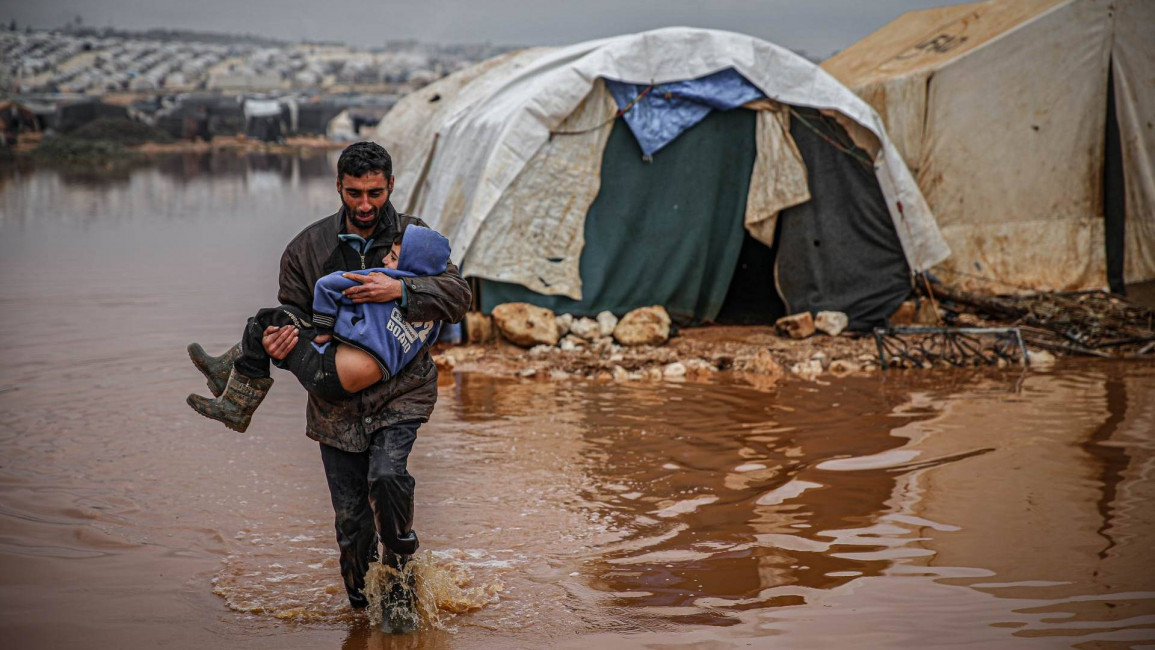Thousands left homeless by storms, floods in Syria's Idlib
A rainstorm lashing the country's northwest these days is spreading more misery, after rain and flooding less than two weeks ago killed one child and destroyed hundreds of tents, leaving tens of thousands of internally displaced Syrians homeless once again.
The harsh weather conditions add to an already disastrous humanitarian situation with the spread of the coronavirus and a worsening economic crisis.
International aid groups have warned that reduced humanitarian access to this part of Syria will impede the response to the effects of the storm in a region already suffering from shortage of humanitarian aid.
"The reality is that people in this area are facing a catastrophic situation," said Mark Cutts, the UN's deputy regional humanitarian coordinator for Syria. "People in these camps are desperate, and humanitarians are overwhelmed by a crisis that the United Nations warned was coming."
Cutts' statement on Thursday said at least 121,000 people in 304 sites in the region were badly affected when torrential rain and strong winds damaged or destroyed at least 21,700 tents. He said one child was killed and three other people were injured.
The rebel-held Idlib province and western parts of Aleppo last year witnessed a crushing Russian-backed government offensive that displaced hundreds of thousands and damaged dozens of clinics and hospitals. More than 3 million people, many of them already displaced by Syria's nearly 10-year conflict, live in the region.
The heavy rain led to floods in some of the tent settlements, washing away many of the people's belongings, including food, at a time when the local currency briefly hit a record low of 3,600 Syrian pounds to the dollar on the black market this week, eradicating much of the citizens' purchase power.
The region has also registered more than 20,000 cases of coronavirus and 382 deaths amid a severe shortage of medical equipment.
|
|
Syria's conflict, which began in March 2011, has left half a million people dead and half the country's prewar population of 23 million displaced, with more than 5 million of them living as refugees outside the country.
Residents and aid groups have complained that the slow arrival of assistance into the almost besieged region is the result of last July's decision by the UN Security Council to limit for a year humanitarian aid deliveries to Syria's northwest to just one crossing point from Turkey.
When the first strong storm hit the region 10 days ago, Abed al-Yassin was sitting with his wife, three sons and one daughter when their tent collapsed and mud flooded in, forcing them to run to his neighbors' more solid tent. The next morning, he started building another tent nearby, making sure to surround it with sand from all sides to prevent water running in.
"Conditions are miserable over here," said al-Yassin, speaking over the phone as a strong wind howled in the background. Luckily, a few days ago they received some packs of pasta they are eating with vegetables for the time being.
Another Idlib resident, Ali Ibrahim and his family of five, had to spend a night in the rain after their tent "collapsed on our heads." They set it up again and now they are staying inside during the latest storm.
Ibrahim said his main problem in winter is not the rain but their wood heater, which makes his six-year-old son, Ahmad, who has a heart problem, cough continuously.
"We have no other choice but to turn it on, otherwise we will freeze," said the jobless, 34-old man. The war displaced his family from the village of Abad in nearby northern province of Aleppo.
The relief Syrian Response Coordination Group, active in northwestern Syria, said the storm that began on Thursday is hitting the same areas that were struck earlier this month. It called for international help to improve infrastructure in the tent settlements to limit damage in the future.
International aid group CARE said the storm has turned camps into lakes in some 87 sites for displaced people, causing loss of the only belongings people had after years of conflict.
CARE has begun distributing plastic sheets, blankets, mattresses, floor mats, kitchen sets, and baby packages to over 3,300 displaced Syrian families in 56 camps.
Follow us on Facebook, Twitter and Instagram to stay connected



